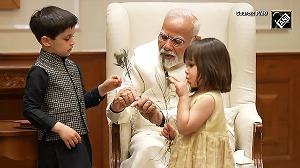The Londoner I asked for the Directory Inquiry number threw up her hands in horror.
"You'll find yourself talking to someone in Bombay or Bangalore," she exclaimed. "It will cost the earth, they won't know a thing and you won't understand a word they say!"
There in a nutshell was popular prejudice at its most raucous reacting to a phenomenon which Singapore's prime minister, Goh Chok Tong, eulogised only the other day when he told the Boao Forum in China, "China has become the world's factory, while India has become its IT and back office."
Sooner or later, Britain's trade unions, a pale shadow of their former robust selves but still powerful, will take up the challenge.
Like the British public, they did not become aware of developments in India until the wholesale transfer of backroom jobs began. A banner headline in the popular tabloid Daily Mail, LLOYDS OFF TO INDIA, must have come as a shock to people who had forgotten that India existed.
In recent times the word conjured up not the brightest jewel in the king-emperor's crown but thriving immigrant communities who built the grandiose temple in London's Neasden, fought others in the streets of derelict Lancashire towns and sent more than a dozen legislators to Parliament.
So compelling is this image of India in Britain that English folk to whom Shah, Patel and Khan are as common as Jones, Smith and Brown have often told me that I was the first Indian from India they had met.
Three factors helped to push India into the shade. First, there were none of those once-regular reports in the media of British, American or international agency aid.
Second, there were no lurid stories about manpower smuggling rackets and illegal immigrants dumped on Dover beach.
Third, New Delhi seemed to exercise great restraint on global issues. While everybody knows what Mohamad Mahathir, until recently prime minister of Malaysia, thinks of Afghanistan, Iraq and, indeed, of George W Bush's war on terrorism, no one in the wider world knows Atal Bihari Vajpayee's thoughts on these subjects.
Reticence is probably a good thing, indicating maturity and pragmatism.
It tells the world that an India that minds its own business is rebuilding its house and garnering the strength to defend its interests abroad.
Foreign policy is effective only when backed by domestic capability.
Joint naval exercises with China, search and rescue measures in the Straits of Malacca or even playing regular host to the US Pacific Fleet reflect the confidence to rise above prickliness.
Hence the Daily Mail report and also let there be no mistake -- the rankling resentment of which the woman I spoke to about Directory Inquiries gave some indication.
The finance union reacted angrily when Lloyds TSB closed down one of its British call centres and transferred 1,000 jobs to India.
"This is a callous move," thundered union official Bernadette Fisher in tones that recalled the AITUC or INTUC, "and shows that it (the bank) has no respect for staff, customers or local communities. It is purely in the business of generating profit without a conscience."
Accusing Lloyds of ignoring proposals to solve problems without axing jobs, UNIFI has warned that it might consider industrial action. There is talk of a campaign involving customers and members of Parliament. If the threat materialises, ethnic Indians in the House of Commons as well as life peers will find themselves in a tricky situation.
Who will they support? Where do their loyalties lie? That apart, the confrontation will extend beyond trade unionism. It will become a matter of race. Politics is born, and usually ugly politics, when economics and ethnicity marry.
It's something to watch out for. No wonder HSBC, which earlier announced the removal to India of 4,000 jobs by the end of 2006, now sounds a note of caution.
"We are only conducting a feasibility study," an HSBC spokeswoman assured a meeting of 350 sales financing staff at Hastings in Sussex. "No final decision has been taken."
Lloyds, too, has promised to handle the loss of jobs in its Newcastle upon Tyne call centre "with care and sensitivity."
Banks, airlines, insurance companies and health insurers already operate through call centres in Delhi, Mumbai, Bangalore and Hyderabad.
Of course, there are problems. In spite of TV and e-mail, people who live 4,000 miles away and have little or no local knowledge cannot always be expected to answer all rail and telephone inquiries authoritatively.
They are bound to slip up. England is full of jokes about Indian operators in India being schooled in Scots or Midlands accents to sound genuine to callers but falling down when it comes to small physical details. But few serious complaints have been made.
With Indian wages still only about one-tenth of Western levels, the trend is probably irreversible.
According to one estimate, another 30,000 jobs in the British financial and insurance sectors will be transferred to India during the next five years.
Some consultants believe that India will earn something like 17 billion pounds annually from outsourced jobs by 2008.
Not that the West is doing India any favour. Its search is for cost effectiveness. When costs rise in India, British call centres will move on to some cheaper country.
Just follow the trail of Nike shoe manufacture from South Korea to Malaysia to Indonesia. No resting place is permanent. Each is determined only by the overheads. That is of the essence of globalisation.






 © 2025
© 2025